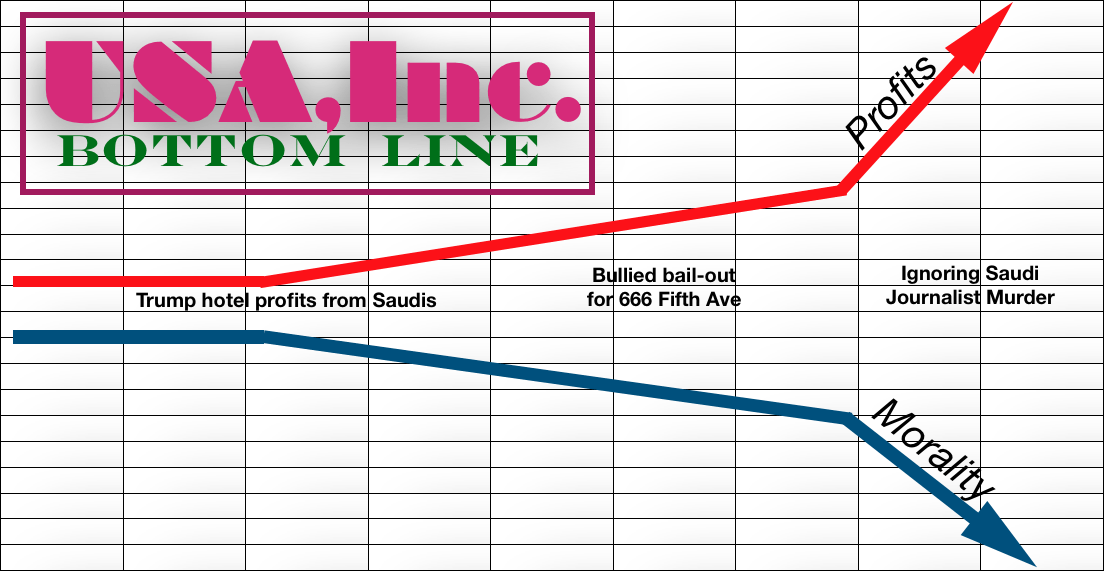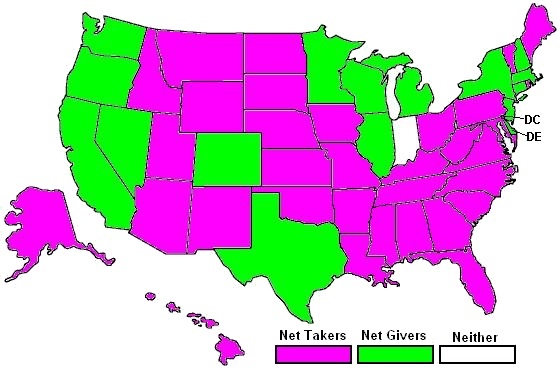By Steve Schlich — My premise is brutal: business is a cross between a dictatorship and a junta …which makes government run as a business just plain fascist. If you think that’s too arbitrary a judgment, consider the bedrock principle of business: maximize income, minimize expenses.
Now try a thought experiment—apply those principles to the balance sheet of a business we’ll call USA Incorporated. Your first action is an easy choice: calculate which parts of the company are profitable, and which are not.
Every successful company rids itself of resources that carry a negative economic value. If it can. One example: employees who cost more than they contribute. Let’s say they are long-term workers who are now paid well for doing jobs that lesser experienced (and cheaper) employees could do. If you can’t promote them to positions with positive economic value, then strict balance sheet logic dictates that you lay them off.
…and that is why we have laws against age discrimination. But of course these practices haven’t ceased. In a strict business sense, you’d be crazy not to cull the ranks. But the really low-hanging fruit isn’t the old folks, who actually possess skills and knowledge that a company needs. No, it’s employees who are simply not good at their jobs. They cost more to keep on, than to let go.
Okay then. We’re still in the thought experiment. It’s your move, employer. Streamline or die.
Use our country’s “giver” and “taker” states as proxies for employees with positive and negative economic value—occupying opposite ends of the USA Incorporated balance sheet. Consider this color-coded map, from the World In Motion blog article Givers vs. Takers…
The green sixteen in the map above are “giver” states—they contribute more dollars (in federal taxes) to the U.S. Treasury than they take away (in federal expenditures). They are: California, Colorado, Connecticut, Delaware, Illinois, Massachusetts, Michigan, Minnesota, Nevada, New Hampshire, New Jersey, New York, Oregon, Texas, Washington, and Wisconsin.
Just sixteen out of fifty states, folks. Note that only three of them voted “red” in the 2016 presidential election: Michigan, Texas, and Wisconsin—and Texas is the only consistently red state.
Now consider the 33 “taker” states—which contribute fewer dollars to the U.S. Treasury than they cost: Alabama, Alaska, Arizona, Arkansas, Florida, Georgia, Hawaii, Idaho, Iowa, Kansas, Kentucky, Louisiana, Maine, Maryland, Mississippi, Missouri, Montana, Nebraska, New Mexico, North Carolina, North Dakota, Ohio, Oklahoma, Pennsylvania, Rhode Island, South Carolina, South Dakota, Tennessee, Utah, Vermont, Virginia, West Virginia, Wyoming.
Twenty-seven of these takers (and 1/2 of Maine) voted “red” in 2016. It’s my guess that many of these voters think that they hate socialism without realizing that they are, in fact, its beneficiaries.
If the USA were actually run like a strict capitalist business, these states would be summarily laid off: Here’s a few months severance pay and health care coverage. After that, good luck!
But of course we’re a country, and we don’t dismiss citizens, or their states, because they aren’t as productive as others. It’s like a family, where the children cost far more than they contribute, and yet we allow them to stay. That’s socialism! So if you hate socialism, then it’s time to send each of your children off to the work house. Grandma, too. No slackers allowed!
COASTAL SIDEBAR
I find it noteworthy that of the sixteen “giver” states, only two—Nevada and Colorado—lack significant shorelines. Water ports breed both economic strength and tolerance. How? They draw commerce and increase residents’ exposure to people from other places—which teaches them that “others” are not a threatening group. They’re people, just as we are, but from somewhere else.
Eighteen of the 33 “taker” states lack a coast. But if you look at a red-and-blue map of state counties, you’ll see blue lining all the waterways in this country’s landlocked interior. Once again, a shoreline creates life experiences which breed tolerance.
Business in and of itself is coldly elemental, as previously noted. It’s a transactional process that pits income against expenses. You can’t expect such a process to be humane. But businesses exist in the world of people. People run those businesses, and other people—customers—patronize and fund those businesses.
Thus: paying attention to people, your employees and your customers, is how you elevate business above insect-like savagery. It has to go beyond selling a product.
For example, a company that I worked for allowed me to volunteer at a soup kitchen for 90 minutes of company time, every month. That same company doled out its share of business-process heartbreaks for some employees—like all companies must—but this charitable action, something that didn’t need to be done and didn’t generate income, humanized the company. My employer was not so into profit that it couldn’t spare 90 minutes of my pay—and that of a half-dozen others—to help the homeless and the hungry.
You can argue that my company really did that to ingratiate itself with the community, not to be altruistic. It’s a fair assessment. And I will reply that my bosses could have simply donated dollars to the community, but instead asked me to add my own participation to the donation. That wrinkle made it worth something to me, as well as to the people I was helping.
The lesson is decidedly un-capitalist: it’s okay to care about the welfare of others, even at the expense of the bottom line. And it’s beautiful that my company did that, even though it was far from perfect in other ways.
But for some businessmen, wealth’s bottom line is the only arbiter of behavior. The relentless need to generate income can become an end unto itself. And you know the question asked about billionaires who seem driven to amass more and more and more: How much is enough?
For Donald Trump, enough doesn’t exist.
Forget collusion in the 2016 election. The following is my opinion, but there’s plenty of evidence to support it… Trump’s subservience to Vladimir Putin is financial, and mostly voluntary. It goes way back. Putin’s kleptocracy has been laundering “profits” through Trump at least since the new millennium. He’s been laundry boy for the Russian mafia since the Nineties. Don Junior admitted as much in 2008, and Eric in 2014.
But this is hardly a one-sided situation; both the holder and the launderer of illicit money realize a profit. You would think that each side of the transaction wielded some power, because they need each other.
But Trump’s end is even simpler. He worships Putin. Other authortarians too, but Putin has mastered both power and Trump’s main love: money. The former KGB agent has amassed a fortune second only to Jeff Bezos, and he wields international influence that Bezos can only dream about. He can have people killed! Trump once joked about doing that himself on Fifth Avenue, but Putin has actually done it, and gotten away with it.
Isn’t the President of the United States, alleged Leader of the Free World and commander of its most extensive armaments, supposed to be more powerful than the dictator of a country with an economy 1/12th the size of the USA’s? You’d think so. But as many people have asked many times, why then is Trump such a subservient puppet?
My answer is an image you’ll wish you could forget: Putin clutching Trump’s testicles. A metaphor for his grip on Trump’s finances. That grip drives the involuntary portion of Trump’s bootlicking. Putin can either enrich The Donald or destroy him with an iron contraction of his fist. It’s the simplest of transactors for Trump: do what Putin wants and reap the considerable rewards. Or disobey and suffer the considerable consequences.
Trump’s admiration for Putin makes his subservience feel like a choice, but he’d be on his knees regardless.
One thing that Ivanka Trump may see in her husband Jared Kushner is a trait that she’s observed in her father, all her life: overspending other people’s money on grandiose projects. Without consequences. With Trump it was his casinos, which he spent into bankruptcy while paying himself millions in salary. With Kushner, it is 666 Park Avenue, for which he overpaid like some tourist buying the Brooklyn Bridge.
For several years, Kushner watched the approach of a bankruptcy-inducing balloon payment, one that he could not make because the building lost major tenants during the recession.
He thought he had a deal with Qatar for a loan, but it fell through. As a consequence, Kushner’s father-in-law—the President of the United States—labeled Qatar “funder of terror at a very high level” and supported a Saudi-sponsored blockade of Qatar, despite the fact that the U.S. maintains a large air base there.
Screw our military allies and our position in the geopolitical world! Let’s base foreign policy on questions such as, why aren’t you loaning my son-in-law money he’ll never pay back?
In the end, Qatar did make Kushner’s $1 billion-plus payment for him, through a Canadian company that leased the building for 99 years and paid for all of it up front. Qatar then pretended surprise at the deal, even though it is one of that company’s major investors.
The ugliness doesn’t end there. The Saudi crown prince and scary new power broker Mohammed Bin Salman claims to have Kushner snugly “in his pocket,” which is true enough, but the U.S. has a very long history of supporting Saudi Arabia’s oppressive government—because it suits our business interests.
Trump praised U.S. relations with Saudi Arabia while Rand Paul, uncharacteristically speaking for many members of Congress, said on Twitter,
“The Saudis will keep killing civilians and journalists as long as we keep arming and assisting them. The President should immediately halt arms sales and military support to Saudi Arabia.”
Trump’s response carried classic business blinders: “What good does that do us? I would not be in favor of stopping a country from spending $110 billion — which is an all-time record—and letting Russia have that money and letting China have that money.”
That wasn’t quite the truth (the Saudis would have to start from scratch with Russian or Chinese weapons) but it aptly demonstrates how a seemingly endless reservoir of oil and its attendant money makes Saudi Arabia #1 on the list of Countries To Befriend no matter what. And there is a scary list of no matter whats…
- Trump’s bromance with the Saudis and their money is really about tending to his own business interests. The Washington Post reported “At President Trump’s hotel in New York, revenue went up this spring — thanks to a visit from big-spending Saudis.”
- Truly shameful is Trump’s defense of journalist Jamal Khashoggi’s murder, an act clearly performed under orders from Saudi crown prince Mohammed bin Salman. It’s the same wide-eyed innocence that Trump feigns when denying Russian interference in the 2016 election.
- It gets even worse. Trump’s people plotted to deport Turkish cleric Fethullah Gulen, to placate Turkey’s strongman Recep Tayyip Erdoğan. Understand: Erdoğan wasn’t angry that the Saudis tortured and murdered a journalist on his soil. He was angry because he wasn’t consulted. If the U.S. actually did deliver Gulen to him, Erdoğan would have him tortured and murdered as well.
In a Washington Post story, Jennifer Ruben explains Trump’s fascination with authoritarians: “…once [Trump] got elected, he failed entirely to appreciate that he could not control investigators, witnesses, the press and even former associates.
“Former Trump consigliere Michael Cohen told ABC News that that ‘…the pressure of the job is much more than what he thought it was going to be. It’s not like the Trump Organization where he would bark out orders and people would blindly follow what he wanted done.’”
We’ve circled back to the core concept: business is an authoritarian process, even fascist, but that’s to be expected. It’s up to the people running a business to execute with grace and honesty.
Good luck with that, for Donald Trump’s U.S.A. Inc.
Finally, here’s a business you can run yourself, for fun and profit: Trump fans have desperately spent millions on a GoFundMe page for the wall, but they’re probably getting duped. “There is no legal way to give that money to Trump to build a wall, and the goal of $1 billion is far short of the $6 billion Trump is asking for from Congress, let alone the $25 billion that experts say he would actually need. But hardcore Trump supporters are falling for it all over again.”
As of this writing, they’ve contributed some $20 million, and the owner of the GoFundMe page is claiming that he will use the money raised to build sections of the wall himself. Right.
As my wife said about a Trump claim of charitable contributions: “Show me the receipt.”








Steve Schlich | Author | April 15, 2019
|
The notion of running our government like a business also falls apart at the first mention of tax cuts. Find me a successful business operating with the priority of reducing its income.